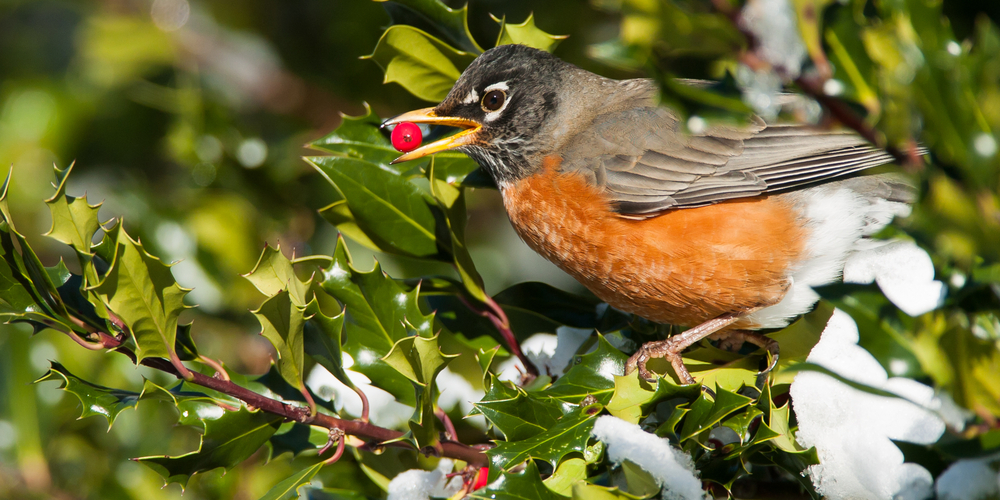If you live in the city, you have probably heard a Robin singing at night. This phenomenon might perplex you – as it does the scientific community – since American Robins are not nocturnal.
So why do they sing at night and why do they only do it in urban areas? Let’s ponder this question in detail.
Recognizing a Robin’s Song

Before we get into why American Robins sing at night, how do you know that the bird you hear singing is a Robin and not another nocturnal bird? You can recognize the call of a Robin as the repeated, clear, and rhythmic whistle that sounds like a “cheer up” echo.
The song speeds up at dawn and is slower at night and during the day. If you are still not sure, you can listen to audio clips of the Robin’s song in the Sources section of the All About Birds section of The Cornell Lab of Ornithology.
Reasons Robins Sing at Night
According to researchers, American Robins sing at night because the noise in the city during the day keeps their songs from being heard.
Studies have shown that Robins living in urban areas exhibit abnormal singing habits and sleep patterns and are more likely to practice nocturnal singing.
It has also been postulated that the bright city lights from street lamps prevent Robins from recognizing the end of the day.
Put together, these factors affect the sleep cycle of Robins, leading them to sing at night. Here is a closer look at these causes:
1. Urban Noise
One characteristic of most cities is significant noise pollution, usually stemming from sources like construction sites, nightclubs, and car traffic.
This noise tends to drown out various songs and calls from birds made during the day. Since birds rely on these sounds to send each other warnings, find mates, and establish their territory, this inability to communicate presents a challenge.
Consequently, some birds have learned to remain awake later than usual and sing their songs at night. They take advantage of the quieted city noise to send the much-needed signals to each other. These same birds may wake up earlier than usual for the same reason.
2. Artificial Lighting
Artificial lighting in urban centers can also influence the behavior of birds like the American Robin. The bright lights in a city confuse some birds into thinking it is still daytime and cut the amount of time the birds spend resting.
Overall, the effect is just as significant as city noise as has been established by a new project at Glasgow University designed to study why Robins exhibit nocturnal behaviors in the city.
Dr. Davide Dominoni, who heads the research, is convinced that city lights trick Robins into thinking there is no end to the day.
Robins are particularly sensitive to light changes as they have naturally adapted to foraging insects in dim light. Dr. Dominoni is of the opinion that the blue light emanating from neon signs in cities is the most disruptive to the Robin’s sleep-wake cycle.
Are American Robins Nocturnal?
The reasons given for the nocturnal singing exhibited by Robins in urban areas have been debated vigorously.
Some researchers hold that the singing is caused by loud city noises during the day while others believe it is a result of city lights and disrupted sleep cycle. In some debates, people have argued that Robins are nocturnal. So, are they?
No, American Robins are naturally diurnal. They are most active during the day and rest at night, usually in large flocks. In fact, the nocturnal singing observed in Robins living in the city is said to affect the birds in very negative ways.
Singing uses up a lot of energy and increasing the amount of singing a Robin does at the expense of rest, leads to physiological problems.
Experts have recommended that city dwellers reduce the amount and intensity of light they put out, especially in areas considered natural bird habitats. Some actions that would help ease the stress felt by Robins include placing shields over street lamps or modifying the spectrum to reduce light pollution.
Since Robins sing to ward off rivals and attract mates, the increased output and expended energy can make them less alert to their environment. The continuous singing could also disrupt normal communication, leading to disharmony among a flock.
Robin singing at night: Conclusion
Overall, urbanization is believed to be behind the unusual occurrence of a Robin singing at night. City lights and noises have disrupted the natural sleep cycle of Robins, which are very sensitive to sound, by making it difficult for them to tell day from night.
The combined effect is that Robins sleep for fewer hours and deplete their energy resources at night by singing when they are supposed to be resting. The phenomenon, while fascinating, actually poses a health risk to American Robins.
You may also like: What Time Do Raccoons Come Out?
